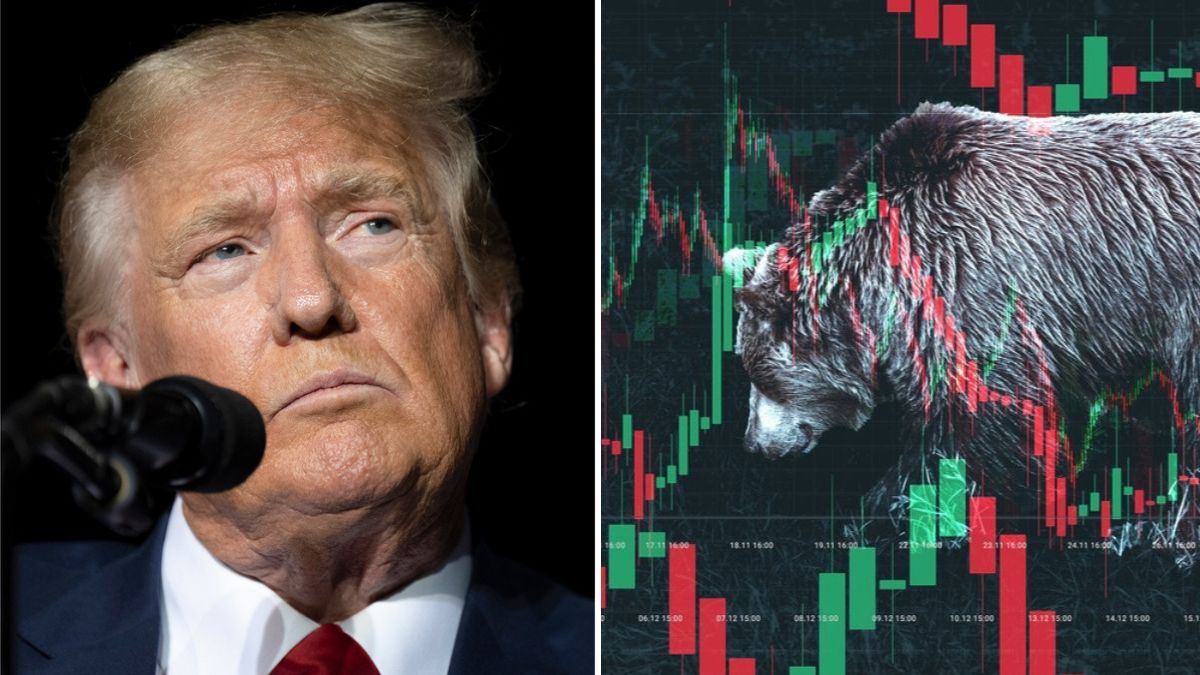Friday meltdown: Global markets continue to fall; Sensex, Nifty close over 1% lower
 Equity markets plunged ahead of US President Donald Trump's reciprocal tariff | AP, Shutterstock
Equity markets plunged ahead of US President Donald Trump's reciprocal tariff | AP, Shutterstock
Equity markets ended the week in red, with the benchmark indices declining more than 1 per cent on Friday tracking deep cuts in other global markets amid increasing concerns that the sweeping import tariffs announced by US President Donald Trump will hit global economic growth.
There was a sell-off in equity markets across the world on Thursday following the tariff announcement. But, Indian markets had been relatively better, with only minor declines. Pharmaceutical stocks, in particular, had rallied as they had been exempted from the tariffs. India exported $8 billion worth of pharma products to the USA in fiscal 2024, its largest export destination, and supplies 40 per cent of generics consumed in the USA.
Also read | Donald Trump tariffs to hurt India's economic growth; ongoing trade negotiations could be key to lowering rates
However, pharma stocks fell on Friday, wiping out gains from the previous session after Trump clarified tariffs were likely to be levied on the sector too.
“Pharma (tariff) is going to be starting to come in, I think, at a level that you haven't really seen before,” Reuters quoted Trump speaking aboard Air Force One.
Also read | India's pharma sector treads cautiously as Trump tariff threat continue to loom large
Pharma stocks fell sharply post that news; Ipca Labs, Laurus Labs, Sun Pharma, Indoco Remedies, Lupin and Glenmark Pharma among others ended 3-7 per cent lower. The BSE Healthcare index, which had gained 1.8 per cent on Thursday, slumped 3.2 per cent on Friday.
Overall, the BSE Sensex closed around 931 points or 1.2 per cent lower at 75,364.69 level and the 50-share NSE Nifty ended 346 points down (1.5 per cent) at 22,904.45 level.
Selloff continued in global markets on Friday; Japan's Nikkei 225 index plunged 2.8 per cent, Hang Seng in Hong Kong dropped 1.5 per cent, London's FTSE 100 slumped 3.7 per cent, France's CAC 40 down 3.8 per cent and the DAX in Germany tumbling 4.5 per cent.
"We are still assessing the macroeconomic implications of the announced tariff measures, but they clearly represent a significant risk to the global outlook at a time of sluggish growth," Kristalina Georgieva, managing director of the International Monetary Fund (IMF) said on Thursday.
Georgieva stressed it was important to avoid steps that could further harm the world economy and appealed to the United States and its trading partners to "work constructively to resolve trade tensions and reduce uncertainty."
Other than pharma, metals, automobiles, capital goods makers and oil companies were among the major losers.
"Investors fear Trump's reciprocal tariff policy will fuel recession and drive inflation in the US going ahead and will also engulf other key economies. A sharp fall in metal and oil stocks is indicating that demand could be hit amid slowdown fears," said Prashanth Tapse, senior vice president (research) at Mehta Equities.
Software services companies also remained under selling pressure with Infosys, TCS, HCL Tech and Tech Mahindra falling around 3 per cent or more. While the companies are not directly subject to tariffs, any growth slowdown in the US, among the biggest markets for IT outsourcers, and inflationary pressures there, could lead to tighter client budgets and in turn, only delay sector recovery.
While automobile exports to the US from India are low, auto component makers are staring at a hit on their earnings, should the potential slowdown in the US hit automobile demand.
"India's auto component exports accounted for 29 per cent of industry revenues in the financial year 2024. Of this, 27 per cent went to the US. While the situation is evolving, the recent tariff-related development and the consequent inflationary pressures and slowdown in demand in the US could have a negative impact on revenue and earnings for component exporters over the next few months," said Srikumar Krishnamurthy, senior vice-president and co-group head, corporate ratings at ICRA.
Even smaller enterprises will now be bit hard since even packages below $800 will be subjected to a duty, which so far has not been, pointed Rahul Ahluwalia, founder - and director, of Foundation for Economic Development and formerly with Niti Aayog and Bill and Melinda Gates Foundation.
India and the US have been in a dialogue for a bilateral trade agreement. Ahluwalia says India can only benefit if a deal is struck and the country gets in a lower tariff band than other competing countries.
Business